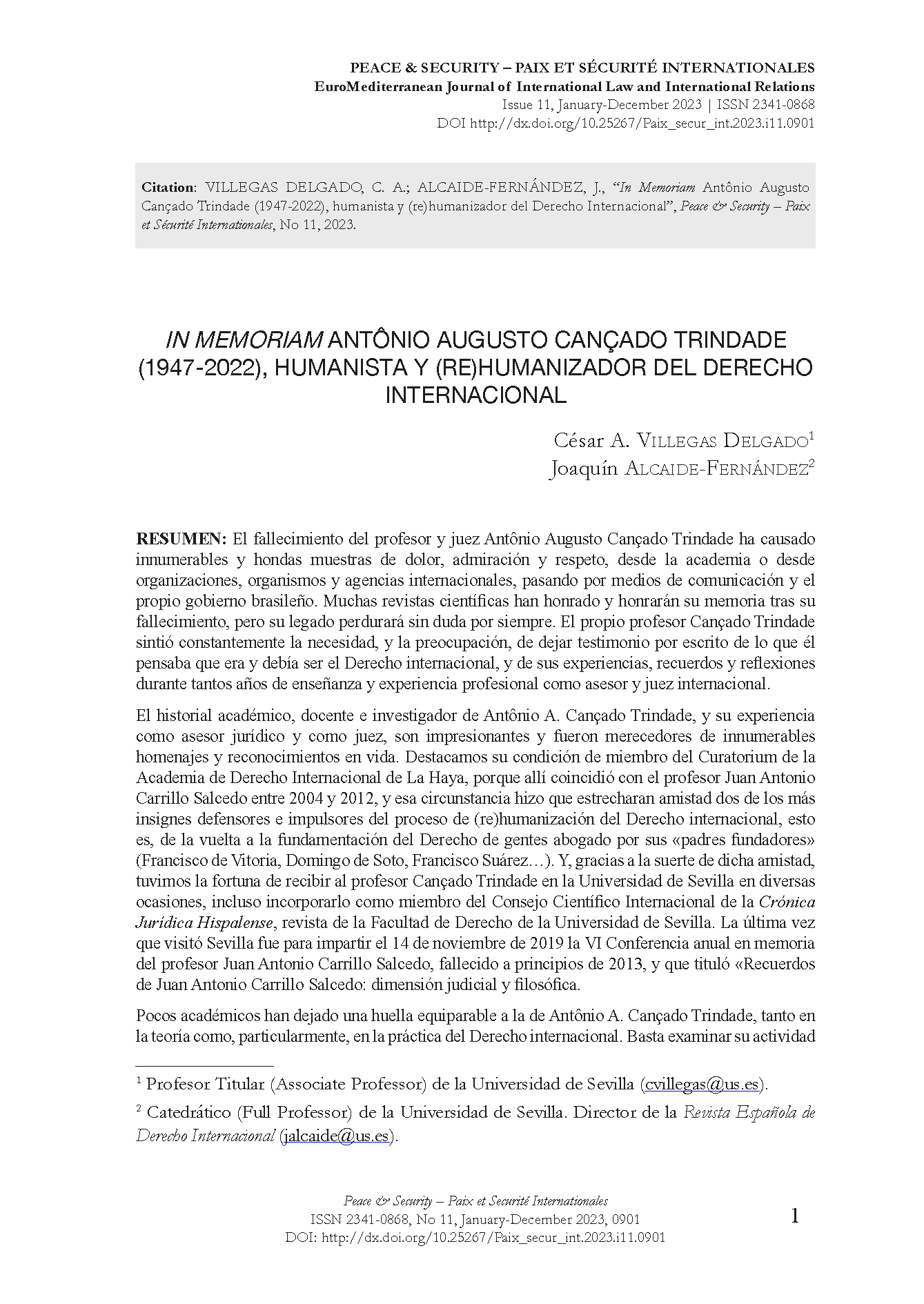In Memoriam Antônio Augusto Cançado Trindade (1947-2022), humanista y (re)humanizador del Derecho Internacional
Abstract
IN MEMORY OF ANTÔNIO AUGUSTO CANÇADO TRINDADE (1947-2022), HUMANIST AND (RE)HUMANIZER OF INTERNATIONAL LAW
The death of Professor and Judge Antônio Augusto Cançado Trindade has caused countless expressions of grief, admiration and respect, from academia to international organizations, bodies and agencies, from the media to the Brazilian government itself. Many scientific journals have honored and will honor his memory after his death, but his legacy will undoubtedly live on forever. Professor Cançado Trindade himself constantly felt the need, and the concern, to leave a written testimony of what he thought international law was and should be, and of his experiences, memories and reflections during so many years of teaching and professional experience as an international consultant and judge.
Antônio A. Cançado Trindade’s academic, teaching and research record, and his experience as a legal adviser and judge, are impressive and merited countless tributes and acknowledgements during his lifetime. We highlight his status as a member of the Curatorium of The Hague Academy of International Law, because he met there Professor Juan Antonio Carrillo Salcedo, then Full Professor of the University of Seville, between 2004 and 2012. This circumstance led to a close friendship between two of the most distinguished defenders and promoters of the process of (re)humanization of international law, that is, of the return to the foundations of the Law of Nations advocated by its «founding fathers» (Francisco de Vitoria, Domingo de Soto, Francisco Suárez...). Thanks to the good fortune of this friendship, we had the good fortune to receive Professor Cançado Trindade at the University of Seville on several occasions, and he was appointed as a member of the International Scientific Council of the Crónica Jurídica Hispalense, the journal of the Faculty of Law of the University of Seville. The last time he visited Seville was to deliver the VI Annual Conference in memory of Professor Juan Antonio Carrillo Salcedo, who passed away in early 2013, on 14 November 2019, and which he entitled “Memories of Juan Antonio Carrillo Salcedo: judicial and philosophical dimension”.
Few academics have left a mark comparable to that of Antônio A. Cançado Trindade, both in the theory and, particularly, in the practice of international law. It is sufficient to examine his activity as an international judge, which he did not in any way dissociate from his legal thinking as an academic, but, on the contrary, with an uncommon consistency in defending his ideas in the forum and translating them into law. First, in the Inter-American Court of Human Rights (IACtHR), the judicial body of the Inter-American human rights system, based in San José, Costa Rica (1991-2006), of which he was president between 2001 and 2004. Then, at the International Court of Justice (ICJ), the principal judicial organ of the United Nations, based in The Hague (the Netherlands), since 2009.
In his academic writings and in his judicial activity at the IACtHR and, even more difficult, because it is essentially an inter-state jurisdiction, at the ICJ, Professor and Judge Cançado Trindade sought to strengthen the international public order, devoting many pages to the norms of jus cogens and to the gradual material expansion of their content, actively participating in the conceptual and jurisprudential construction of the corresponding obligations of protection erga omnes both in their vertical dimension (from the State to the persons under its jurisdiction) and in their horizontal dimension (between persons). Judge Cançado Trindade’s individual opinions offer a series of legal analyses with high doctrinal value that make it possible to understand the essential components of the evolutionary process of the humanization of international law.
The lessons drawn from Judge Cançado Trindade’s judicial work and votes at the IACtHR and the ICJ highlight the particular conception of international law defended throughout his life: a new international law for the human beings which implies the overcoming of legal positivism - particularly defended by the ICJ in its judgments - which is discredited, as he argues in his votes, by the fact that the human conscience is above the will of the states.
This process of humanization, as Professor Cançado Trindade has been arguing for more than four decades, has given rise to the awakening of a universal legal conscience whose central objective would be to reconstruct the foundations of international law, based on a new paradigm, not exclusively inter-state, in which the human being occupies a central position and in which its normative provisions positivize the interests collectively legitimized by humanity as a whole. This conception of international law places Professor Cançado Trindade in the same line of thought as the «founding fathers» of international law, particularly Francisco de Vitoria, Domingo de Soto and Francisco Suárez, who, within the scholastic philosophy of natural law and, particularly, within the framework of a Stoic Thomistic conception of recta ratio and justice, recognized, already in the 16th century, the human being as a social, rational being endowed with intrinsic dignity, a thought also shared by our master Juan Antonio Carrillo Salcedo.
Downloads
How to Cite
License
Copyright (c) 2023 PEACE & SECURITY-PAIX ET SÉCURITÉ INTERNATIONALES (EuroMediterranean Journal of International Law and International Relations)

This work is licensed under a Creative Commons Attribution-NonCommercial 4.0 International License.
Copyright
Es condición para la publicación que el autor o autores ceda(n) a la Revista, en exclusiva, los derechos de reproducción. Paix et Sécurité Internationales es una revista que proporciona un acceso abierto inmediato a su contenido totalmente gratuito para lectores como para los investigadores que pretendan publicar en ella, ya que no se realizan cobros por concepto de envío, procesamiento ni publicación. Los usuarios podrán leer, descargar, copiar, distribuir, imprimir, buscar o enlazar el texto completo de los artículos publicados, o utilizarlos para cualquier otro propósito, dentro de la legalidad vigente. Y podrán hacerlo sin coste alguno, y sin necesitad de solicitar permiso al editor a al autor. Todo ello de acuerdo con la definición de acceso abierto de la Iniciativa Acceso Abierto de Budapest.






